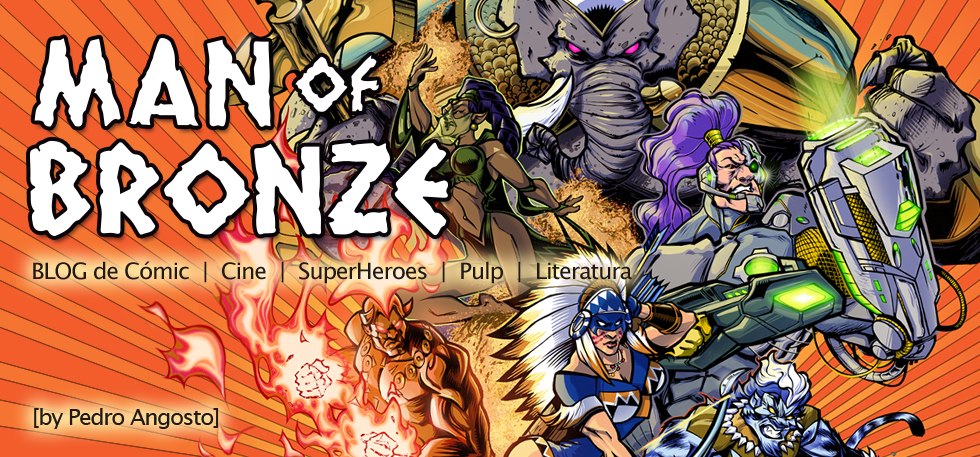Pero un buen autor adapta sus historias a los artistas con los que trabaja, y Moore supo conjurar con LEAGUE OF EXTRAORDINARY GENTLEMENT el vehículo perfecto para que Kevin O'Neill expresase todo lo que llevaba dentro.
A ellos dos les debo haberme arrastrado con esta invaluable obra de los decadentes superhéroes a la Literatura, primero la de aventuras y luego toda la demás.
A petición de Scott Dunbier, editor original de la obra, Moore ha escrito el siguiente eulogio sobre su amigo y colaborador, además de un bello verso. Un homenaje que queremos compartir.
He grew up in those brick-dust latitudes, on streets with all imaginative fantasy blitzed out of them, and all the bright pulp culture then erupting from the city’s scorched earth as his one escape-hatch; his sole nourishment.
There was an uproarious richness in his upbringing, south of the river – a paternal grandfather, a blacksmith, who’d once punched out a particularly annoying horse; a beloved elder sibling who’d resprayed a stolen car for the Kray-rivalling Richardson brothers to a Spode-like lustre and earned the enduring nickname ‘Spoge’ from the mal-appropriate gangsters – and it all soaked into his drawing-hand along with the silvery monochrome of the period’s TV and cinema, the blazing primary colours of its paperback covers and its comics.
A committed autodidact who was done with education even earlier than myself, at sixteen Kevin flung himself into a comics field which he would come to greatly dignify with his astounding contributions.
Working as an editorial assistant on the British juvenile weeklies that were then going through a golden age of innovative energy, he quickly learned both the industry’s glories and its brutalities, studying the line-work and the shading effects of the masterly artists whose signatures he was being employed to remove from their work with white-out.
What made him unique amongst his generation of comic creators was the breadth of his influences and experience. While most of his contemporaries were modelling their styles solely upon the incoming wave of great American talent, Kevin was assimilating the angular transatlantic elegance of, say, Spiderman creator Steve Ditko, without abandoning his love for the manic cartoon grotesquery of England’s Ken Reid.
The result was an astonishingly flexible ability to shift from the bold designs of the Edwardian illustrators he had a passion for, to the deranged absurdities of the British children’s fare that he’d been absorbed in since infancy.
Nobody drew like Kevin O’Neill. As a result of one of our more innocuous collaborations, Kevin received the supreme compliment of having his entire artistic style – whether he was drawing a table-leg or a baby carriage – ruled unacceptable by the American industry’s then-extant Comics Code Authority.
When I was putting together my formative ideas for The League of Extraordinary Gentlemen in the lead-out groove of the last century, I quickly realised that nobody save Kevin was qualified to present such a dizzying range of characters, periods, situations and styles with the vitality and ingenuity that the narrative – a ridiculous mash-up of all human fiction since classical antiquity – seemed to demand. Thus began what I think was perhaps the longest, happiest and most productive partnership of either of our careers.
Working with him was an honour, a pleasure, and an education. His knowledge of the culture we were mining was easily as extensive as my own, and in most instances was marvellously complementary.
Some of the best ideas in the series originated in Kevin’s idle mentions of, for example, the rather one-sided literary spat between George Orwell and Billy Bunter creator Frank Richardson, which provided much of the storyline for our elaborate sourcebook, The Black Dossier.
Not only a working relationship, the connection with Kevin was one of the most important friendships of my life. As well as being one of the medium’s most individual and exciting draftsmen, he was also exceptional in being one of the very few working-class creators working in a trashy, gutter art-form that was originally intended only for the poor and supposedly illiterate, since become a gentrified middle-class district with graphic novels in the stead of studio loft-apartments.
Of all my mainstream collaborators, Kevin was the only one who stood solidly beside me in our difficulties with the comic-book publishing industry, and whose commitment was always to the work, like my own, rather than to the financial inducements and bullying of the companies; the manufacturers.
He was also one of the warmest, funniest, most erudite and most courageous people that I’ve ever met. During what we both suspected was our final telephone conversation, we got to say goodbye properly, and take pride in what we’d accomplished with perhaps the only ongoing work in comics history to be deliberately brought to a satisfying ending by its creators, rather than being run into the ground or abruptly discontinued by its publishers.
At one point in our heavily-weighted dialogue, I remarked that in over twenty years of working together we had never had a cross word or a disagreement. Kevin agreed, pointing out that we’d never had sex either, and that he was immensely grateful for both these things. I am going to miss him like I’d miss sunsets.
In the words of English music-hall legend Max Miller, ‘Take a good look, missus. You’ll never see another one.’
Epílogo: No me gustan las etiquetas y menos las políticas, pero he encontrado que esta reciente frase de Moore resume muy bien nuestras actuales diatribas.
"As an anarchist, I believe that power should be given to the people, to the people whose lives this is actually affecting. It's no longer good enough to have a group of people who are controlling our destinies. The only reason they have the power is because they control the currency. They have no moral authority and, indeed, they show the opposite of moral authority"










No hay comentarios:
Publicar un comentario